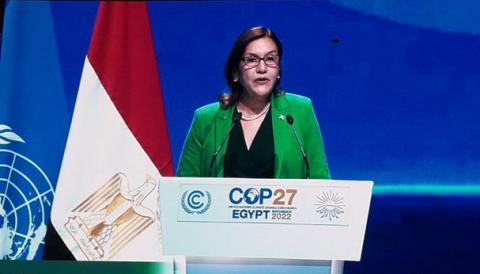Cuba’s Environment Minister at COP27 – “Tomorrow will be too late to do what we should have done a long time ago”
News from Cuba | Tuesday, 6 December 2022

This year has seen the reality of climate change brought into stark focus for Cubans. Hurricane Ian, a Category 3 storm, ravaged the western part of the island at the end of September, killing three people, destroying upwards of 14,000 homes and causing severe damage to Cuba’s power network. Cuba, as a small island in the Caribbean, is one of many nations in the Global South that is particularly susceptible to the damage that climate change can bring. Cuba’s capacity and ability to deal with these effects is further hampered by the 60 year-long US blockade.
It was in this context that Cuba’s Minister of Science, Technology and Environment, Elba Rosa Pérez Montoya, delivered her speech to the Conference of the Parties to the United Nations Framework Convention on Climate Change (COP27) in Sharm el-Sheikh in Egypt on 17 November.
Minister Montoya set out the context in which the climate crisis is taking place in, affirming that “the roots of this problem lie in the capitalist system… responsible for a predatory and consumerist development model”, which in turn “deteriorates the quality of man’s life, his environment and infrastructure”. Montoya set out what the true impact of the crisis looks like, in all parts of the world, as the result of extreme weather events like Hurricane Ian. “People die, cities are destroyed, traditions are affected, the historical memory of nations are affected [as are] the food and energy security of nations”. Importantly, the Minister asserted how these vulnerabilities in Cuba are aggravated and worsened in by the illegal economic, commercial and financial blockade of the United States Government.
Montoya went on the call on Ministers and Governments present to act on achieving a new model of governance and set of climate ethics which are based on solidarity and financial justice, saying that “climate solidarity is to stop acting for individual economic interests, is to think about those who lose living conditions, is to change unsustainable patterns of consumption, is to act and help the most vulnerable.”
Setting out the idea of financial justice, Montoya made the case to compensate poorer nations for loss and damage caused by climate change. Three days later, on 20 November, the conference concluded with a welcome and historic decision to establish such a fund. The first call for specific funding for loss and damage due to climate change, from the Alliance of Small Island States (AOSIS) of which Cuba is a member, came over three decades ago in 1991.
Concluding her speech with the words of Fidel Castro at the United Nations Conference on Environment and Development in Rio de Janeiro in 1992, she reminded delegates that “Man needs to better distribute the wealth and technologies available on the planet… tomorrow will be too late to do what we should have done a long time ago.”






